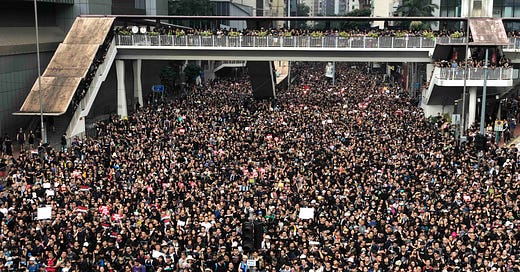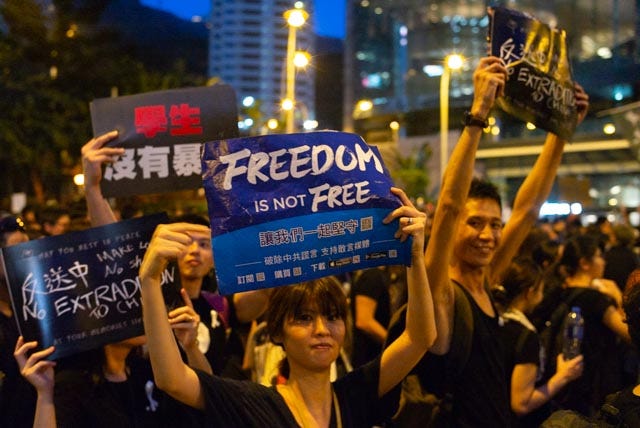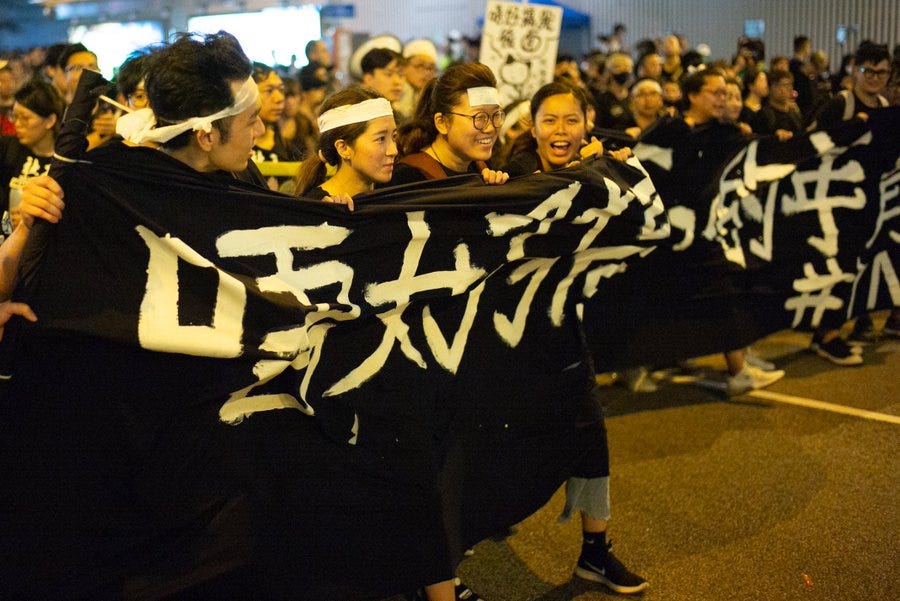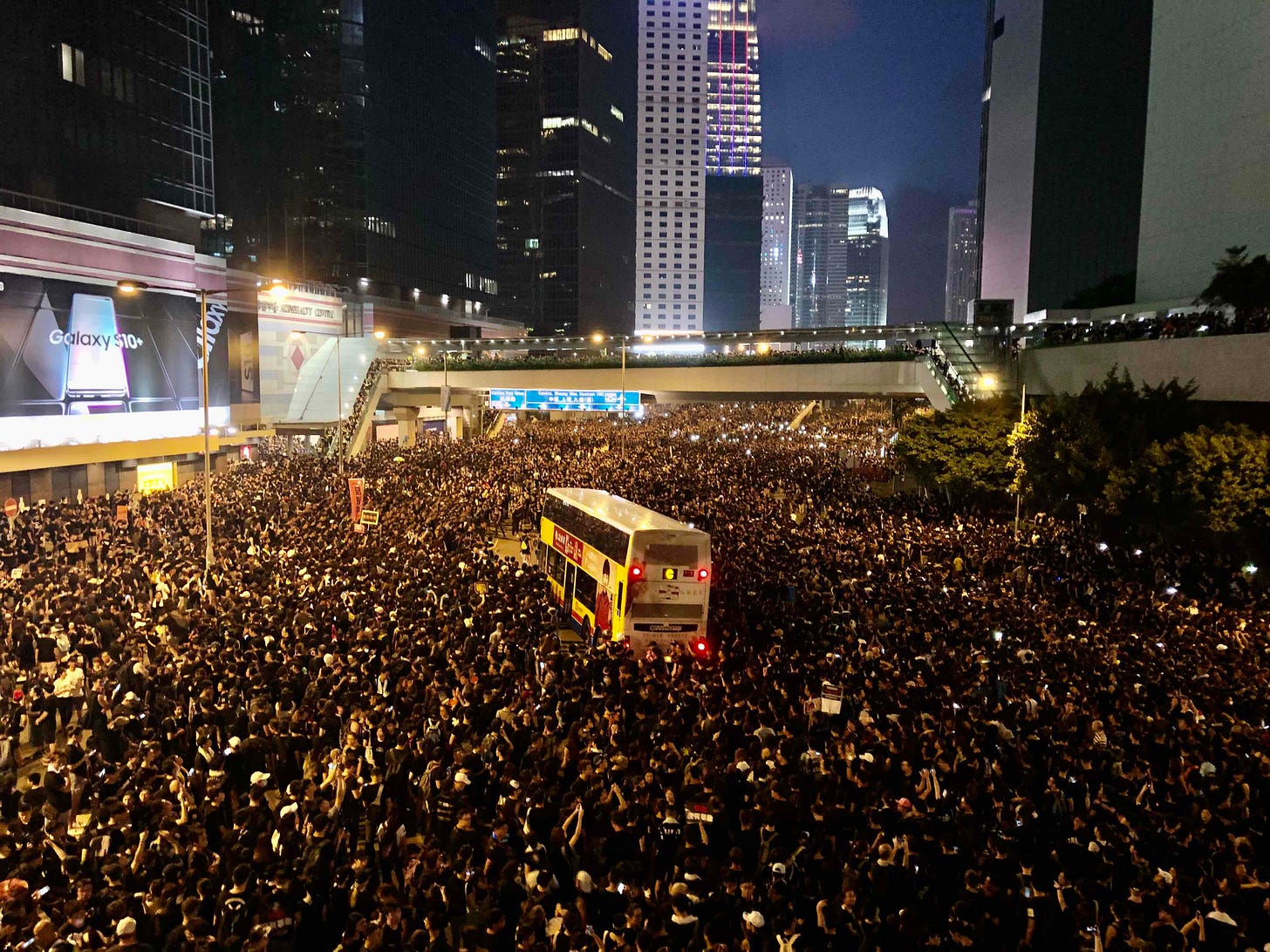Dear friends
I am Antony Dapiran, author of City on Fire: The Fight for Hong Kong and this is A Procrastination, an irregular dispatch from Hong Kong. (Hey, it’s not called A Procrastination for nothing!)
You are receiving this email because you either signed up or have in the past expressed interest in my writing. You can always unsubscribe with one click via the footer at the end of this email. If you want to get in touch, you can reply directly to this email.
In this issue: the prospects for free expression in Hong Kong continue to dim; some thoughts on censorship & self-censorship; recent appearances; and an update to the book.
Were you forwarded this email? Sign up here to receive future instalments directly!
The dying of the light
Without attempting to précis the last five months of news in Hong Kong, I wanted to highlight four recent news items that are worthy of particular attention, all of which relate in various ways to freedom of expression:
First, at the end of May, a Hong Kong court published its reasons for denying bail to Claudia Mo. Mo is one of 47 pro-democracy politicians facing subversion charges under the National Security Law for participating in the pan-democrats primary elections last July. (I covered those mass arrests in my 19th Procrastination back in January.) The judgment makes for pretty scary reading. In reaching the conclusion that Mo would not “not continue to commit acts endangering national security if bail is granted” (the bizarre act of double-negative soothsaying the courts have decided the law requires them to undertake), the court pointed to statements Mo had made to the international media as evidence. Many of those statements had been made prior to the (supposedly non-retroactive) National Security Law, and were not particularly radical. However, the court regarded these “accusations of desperation and loss of human rights and freedom” dimly, and noted that Mo “remained vocal and highly influential in both local and international platforms” — with the implication that speaking to the foreign press in itself constitutes a threat to national security. Bail denied.
As a side-note, the other concerning aspect of several of these recent bail decisions has been the demonisation of the foreign diplomatic community, with prosecutors arguing (and courts apparently agreeing) that simply meeting with a foreign diplomat is also an act endangering national security. More detail in this Reuters piece that ran last Friday.
Second, it was reported two weeks ago that the Hong Kong police had issued an order under the National Security Law to Israel-based website provider Wix, ordering them to shut down the website of 2021 Hong Kong Charter, a site set up by a number of exiled Hong Kong politicians and activists to promote democracy and autonomy for Hong Kong, and solidarity among diaspora groups. In a stark demonstration of the National Security Law’s long-arm jurisdiction, Hong Kong police asked not merely that the overseas-hosted website be blocked in Hong Kong: they demanded the whole site be taken down. (You can read the Hong Kong police’s letter to Wix in full via Nathan Law on Twitter.) This was an attempted act of global censorship which, as far as I am aware, is beyond the scope of anything even Beijing has attempted before, and shows the authorities clear intention to apply the National Security Law on a global scale. Wix initially complied with the demand, before reversing their decision, citing a “mistake”.
Third, in the days leading up to June 4th, Hong Kong’s June 4th Museum was closed by authorities because it did not hold a place of public entertainment (PPE) licence. Last week, independent art space Parallel Space — which was hosting an exhibition marking the 2nd anniversary of the 9 June 2019 protest — was raided by authorities twice, also accused of lacking a PPE license. A much-overlooked piece of Hong Kong legislation, the Places of Public Entertainment Ordinance requires any event open to the public — exhibition, concert, performance, film screening, lecture, dance party, sporting contest — to obtain a PPE license (which may be either permanent or temporary) for the premises where that event will be held. This is a requirement more frequently observed in the breach, given the ridiculously broad scope and an arcane licensing process that makes full compliance near-impossible in practice, although in theory the penalty for failing to be properly licensed is a fine and up to 6 months prison. Yet the PPE licensing regime is one of those archaic colonial remnants — like the Public Order Ordinance and Emergency Regulations Ordinance — ripe for reinvigoration as a tool for “lawfare” and authoritarian control. Expect to see it increasingly weaponised to exert control over cultural events in Hong Kong in the name of national security.
Fourth, last week the Hong Kong government announced new film censorship guidelines that require censorship of films on national security grounds. The guidelines require censors to be aware of their “duties to prevent and suppress [any] act or activity endangering national security”, and in particular target the “portrayal, depiction or treatment of any act or activity which may amount to an offence endangering national security” and any content “endorsing, supporting, promoting, glorifying, encouraging or inciting such act or activity”. The revised guidelines highlight that a film that “purports to be a documentary” requires particular attention from censors. It seems inevitable that censors will err on the side of caution, with the result that no documentary on the 2019 protests will ever be screened in public in Hong Kong again (except perhaps those that support the official line). This will contribute to the government’s broader efforts to re-write history and enforce a collective amnesia in Hong Kong of the same type that prevails in the mainland in relation to June 4. How much longer before media, books and other publications face similar censorship measures?
These events, all occurring over just the past three weeks, give a glimpse of how quickly the environment in Hong Kong is changing.
The simple fact is that, one year ago Hong Kong was a free society, and now it’s not.
It still takes some getting used to.
On censorship & self-censorship
I saw somewhere recently a sentiment expressed along the lines of:
“There is no such thing as self-censorship; there is only censorship.” 1
I, myself, have in the past drawn that common distinction between censorship and self-censorship, observing that the Hong Kong authorities had not (yet) engaged in extensive overt acts of censorship, and that what Hong Kong had faced under the National Security Law was rather an issue of self-censorship. I referred to people scrubbing their social media accounts, taking down protest artwork, and being reticent about speaking publicly, as examples of that.
Yet when I saw that statement — there is no self-censorship, only censorship — it immediately struck me, as soon as I stopped to think about it in the context of Hong Kong, as plainly and deeply true.
As we face the reality of Hong Kong now — including developments such as those I describe above, and how they accrue to impact on people’s behaviour — it is very apparent to me that this is not self-censorship. It is censorship.
Self-censorship does not occur in isolation: it occurs within a context. We need to understand self-censorship in that context, not as an action, but as a reaction. Self-censorship is a response to an environment of fear, to implicit threats of negative consequences for acts of speech and expression that cross vague, undefined red lines. The creation of that environment of fear is the act of censorship.
Out & about
I wrote a review of Stephen Vines’ new book Defying the Dragon: Hong Kong and the World’s Largest Dictatorship, published in the SCMP Sunday magazine a couple of weeks ago. I also managed a very subtle self-referential nod in the final para, see if you can spot it:
“Defying the Dragon takes its place alongside other books that seek, honestly and with integrity, to chronicle a moment in Hong Kong’s history as it faces being rewritten or even erased. Every such work is an assertion of the city’s collective memory, and stakes a claim to the right to tell its story — a right not exclusive to those in power but belonging to everyone who lives here.”
A few recent (and less recent) speaking appearances:
Most recently, I joined the Ho Ho Hong Kong podcast with comedians Andy Curtain and Vivek Mahbubani for a chat about recent developments, as light-hearted and irreverent as circumstances permit, recorded 31 May. Listen here (48 minute listen).
On a more serious note, I gave a keynote speech for the University of Pittsburgh on “Hong Kong: Lawfare and shrinking space for civil society”, recorded 19 May 2021. You can watch it here. (I start at around the 1 hour 36 minute mark and speak for around 80 mins including Q&A.)
“Where to now for Hong Kong?” was an update I gave, recorded 17 February 2021 for Latrobe Asia, and broadcast by the ABC Radio National as part of its Big Ideas program. Listen here (29 minute listen).
Book news
A few months ago my publishers Scribe advised me that the UK edition of City on Fire is up for a reprint. This was not only very gratifying news, but also meant there was scope for an update. Given that there had been quite a few developments in Hong Kong since the book was published in March 2020, I took the opportunity to update the book with a new afterword, summarising the events of the past 12 months.
My University of Pittsburgh keynote (see above) drew extensively on the new afterword, so you could listen to that for a kind of abbreviated audiobook version. And I should add that if you have been a regular reader of these Procrastinations and my other published work over the past 12 months, most of the material will be familiar to you.
The updated book — correcting all the typos (!) from the first edition and with the new afterword — will be available in the UK edition (which is the edition that is sold in Asian markets), I guess whenever the first print run has sold through.
And finally
It’s been a big fortnight of anniversaries in Hong Kong, culminating in tomorrow, 16 June, the day of the March of Two Million. That day is the way that I like to remember 2019: a day that, despite the defiance and anger and sorrow, had at its core a kind of deep joy that feels very distant now. A few of my photos to remember that day below.
This has been a procrastination. Thanks for reading.
Antony
The quote was attributed to China historian Jonathan Mirsky, as cited by Didi Kirsten Tatlow.






